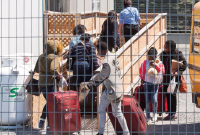Support strong Canadian climate journalism for 2025
Asylum seekers who cross unofficially into Canada — only to wait many months for their refugee claims to be processed — may find their cases finalized sooner as a result of federal changes.
The arms-length board that handles refugee claims plans to speed up the handling of files from irregular border crossers like those seeking refugee status after crossing into Canada from the United States through unofficial forest paths.
The changes will see dozens more Immigration and Refugee Board staff dedicated exclusively to processing irregular border-crossing claims.
Immigration Minister Ahmed Hussen announced the changes Friday, saying anyone coming into the country through irregular means from now on will have their cases finalized within 12 months.
"We believe it will send a very strong message to those who assume that coming to Canada through irregular means will result in them waiting for a long period of time, for years, in Canada and then forming an attachment here. That's not going to happen," Hussen said.
Previous improvements swamped by newcomers
The refugee board has been wrestling with a massive influx of files over the last year as a surge of "irregular" migrants — those who cross the border at non-official ports of entry — continue to enter Canada. A response team was set up in 2017 to cope with the increased workload and long wait times. But improvements were swamped by the increase in cases.
The 2018 budget earmarked $74 million over the next two years to allow the refugee board to hire more staff to help process irregular migrant claims. Those joining the Montreal office will focus mainly on Nigerian and Haitian irregular claims, which make up the majority of these cases. This will develop a specialization among board decision-makers to help increase their productivity, the government said Friday.
In order to ensure regular claims do not get pushed into a backlog, files will be allocated proportionally. This means in Montreal, for example, where 60 per cent of cases involve irregular border crossers, staff will ensure 60 per cent of files they finalize will be claims of irregular migrants.
Resources will be juggled between regions to respond to shifts in caseload demands.
Hearing rooms will also be reopened in Ottawa and a dedicated group of appeals division staff will prioritize irregular appeals cases, with a "last-in, first-out" approach that will see newer cases heard sooner.
The agency estimates these measures will allow it to deal with 17,000 more claims by March 31, 2020.
Hussen added the changes will essentially mean half of the board's resources will be dedicated to dealing with the backlog of older "legacy" cases, while the other half will focus on quickly processing new files.
NDP calls it just a drop in the bucket
NDP Immigration critic Jenny Kwan says she agrees with the concept of creating specialized teams to help streamline processing.
But with an existing backlog of 53,000 files and the number of asylum seekers increasing at a rate of over 2,000 cases a month, clearing an additional 17,000 files by 2020 does not go far enough, she said.
"It's just a drop in the bucket and the wait times will continue to accumulate and the backlog will continue to accumulate."
She wants government to suspend the Safe Third Country Agreement with the U.S. and allow asylum seekers the ability to claim refugee status at official ports of entry — something currently not permitted under the existing agreement.
But Hussen argues doing so would be "completely irresponsible," as it could lead to an even greater number of asylum seekers at official border crossings.
But he did acknowledge the agreement needs updating.
"The fact of the matter is the agreement needs to be updated because it is not enforced in between ports of entry and that is something we have highlighted to the United States and we have to work together to fix that."





Comments